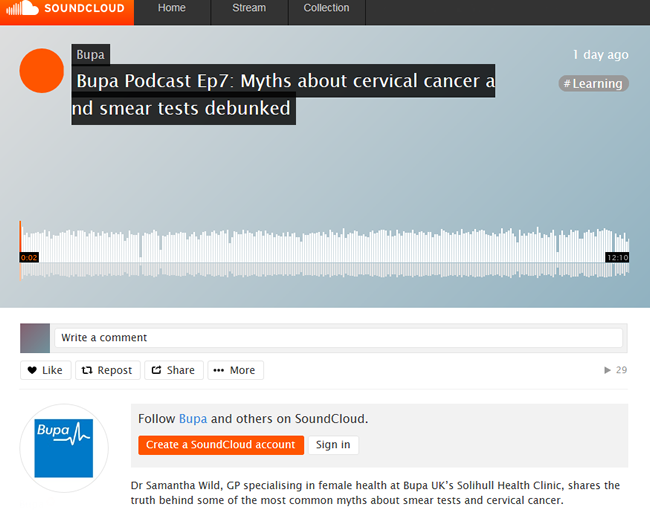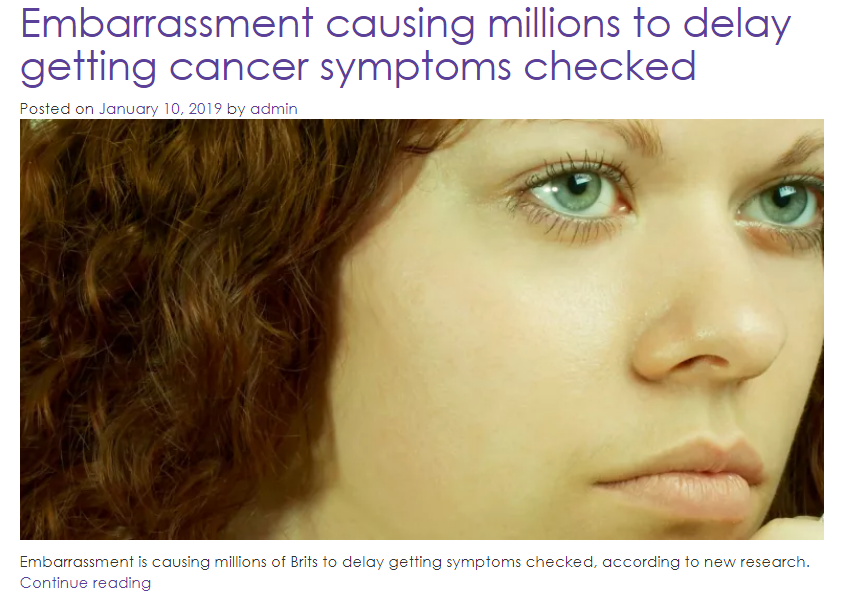Millions of women are avoiding seeing the doctor because they are embarrassed by their lack of knowledge about female health, including cervical screening and cervical cancer.
According to a report by Bupa Health Clinics, as many as two million women believe that you only need to have a smear test, or a cervical screening test as it is also known, if you’re currently sexually active. However in the UK, all women aged between 25 and 64 are recommended for cervical screening if they have ever been sexually active. Women who have never been sexually active are encouraged to discuss screening with their GP as they may still decide to have a test.
In addition, almost a quarter of women falsely believe an abnormal smear test indicates a high risk of cancer. However, in fact less than 1% of people with an abnormal smear result will have cervical cancer. Cervical screening aims to detect changes in the cells on the cervix long before they progress to cancer. These changes are usually caused by some types of the Human Papilloma Virus (HPV), a group of viruses commonly spread during sexual activity – although over three quarters of women in the UK were unable to identify how HPV is transmitted.
Dr Samantha Wild, GP specialising in female health at Bupa UK’s Solihull Health Clinic, shares the truth behind some of the most common myths about smear tests and cervical cancer to raise awareness as part of Cervical Cancer Prevention Week:
HPV isn’t transmitted through sexual activity
HPV can be present all over the area around the genitals and anus, and is spread through skin to skin contact not just penetrative sex so condoms can help but will not reduce the risk of transmission completely. Eight out of 10 sexually active people come into contact with HPV at some point during their lifetime. There is a vaccination programme in the UK to protect against the commonest types of HPV which between them cause more than 70% of cervical cancers.
An abnormal smear test indicates a high risk of cancer
A smear test, or a cervical screening test as it is also known, is not a test for cancer. It is a test to look for abnormal cells which if left untreated may progress to a cancer. If there were any abnormalities shown on the smear test – which happens to 1 in 20 women – then further testing and monitoring would be carried out.
Smear tests are painful
Smear tests can be a little uncomfortable, but they shouldn’t be painful. If you have had a bad experience speak to your doctor or nurse about your concerns and they will do everything they can to help – whether that be bringing someone with you for support or using a smaller speculum or a different position.
You should only have a smear test if you’re currently sexually active
Cervical cancer is rare in women who have never been sexually active as 99.7% of cervical cancers are linked to the high-risk HPV which is sexually transmitted. However, if you have ever been sexually active there is a chance that you may have been exposed to the virus. In most women their immune system will fight it off, but for some it may persist. All women aged between 25 and 64 who have ever been sexually active with a man or a woman should have a smear test. Women who have never been sexually active are encouraged to discuss screening with their GP as they may still decide to have a test.
Having HPV means you will develop cervical cancer
There are hundreds of different types of the HPV, but there are a few high-risk types that can cause cells in the cervix to change. For most the virus causes no harm and goes away on its own. For some this doesn’t happen and if you have a long-lasting infection with a high-risk type of HPV you are more at risk of developing cervical cancer. If you attend cervical screening as advised, you will be treated and monitored to protect against this happening.
Bupa has put together a podcast which debunks five myths about cervical cancer and smear tests. Click here to listen.
Notes:
- Millions of women are avoiding seeing the doctor because they are embarrassed by their lack of knowledge about female health – 15% of female population
- Two million women believe that you only need to have a smear test if you’re currently sexually active – 10% of 27,226,626 (female population in the UK) = 2,722,662
- Almost a quarter of women falsely believe an abnormal smear test indicates a high risk of cancer – 23%
- Over three quarters of women in the UK were unable to identify how HPV is transmitted – 78%
- If there were any abnormalities shown on the smear test – which happens to 1 in 20 women – https://www.nhs.uk/conditions/cervical-screening/




